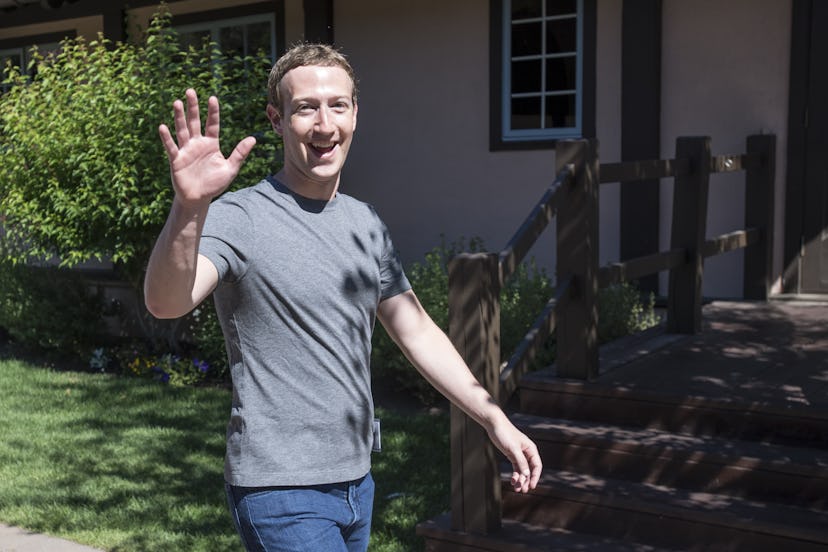The $300 T-Shirt Mark Zuckerberg Didn’t Wear in Congress Could Hold Facebook’s Future
Is Zuck's corporate worldview modeled on that of Brunello Cucinelli, the man who makes his gray tees?

Over the last two days, as Mark Zuckerberg and his haircut testified before a pantomime of a functioning Congressional body, much was made of the Facebook CEO’s suit. Chiefly, that he wore one. Men’s suiting in most contexts, but especially this one, is about as thrilling as a hangnail. But because Zuckerberg has so tethered his personal image to his unchanging ensemble of drab gray loungewear, the look of him—tensed and adrift in a dark blue suit, a J.Crew model on trial for accidentally installing a fascist regime—counts as jarring.
The particulars of the Zuckerberg-as-corporate-CEO rig—over-large jacket, sloppily done tie, booster seat—are well picked over. The New York Times’ sVanessa Friedman, writing that “the suit is the costume of the grown-up, while the T-shirt is the costume of the teenager, the off-duty, the breaker of rules,” noted that the choice acknowledged contrition, or at least the idea that contrition is what was being demanded. (But really, it was Zuckerberg’s hair rather than his suit doing the heavy lifting. Cut back into his sweaty pate in a near-tonsure, it made him look like a Capuchin monk come down from the monastery for his lashings.) The Washington Post’s Robin Givhan, less impressed, wrote: “He was wearing the tie, but he clearly didn’t want to be. There was no hint of pride in his appearance. No personal flair or polish. Everything about his attire was perfunctory.”
Zuckerberg is certainly deeply awkward and possibly deserves to be in jail, but that doesn’t preclude him from caring about clothes. His adopted uniform, like that of Steve Jobs before him, has surpassed public fascination into cliché; his daily livery of ill-fitting hoodies and jeans has become both Silicon Valley’s dress code and its dominant personality. If there’s one thing at work in how Zuckerberg dresses, it’s pride.
We know Zuckerberg is not immune to fashion because we know the pigeon gray T-shirts he favors are custom-ordered from Brunello Cucinelli, and we know they go for upwards of $300 a pop. But what’s most interesting about Zuckerberg’s loyalty to Cucinelli, which goes back to at least 2016, is not that he would spend that kind of money on luxury basics—people have been conditioned into believing boring, expensive clothes are less boring for being expensive—but Cucinelli’s own corporate ethos. Cucinelli has succeeded in selling an ostensibly modest look of earth-toned cashmere (the company had a market capitalization of over $1.5 billion in 2015) by yoking that cashmere to an expansive worldview that cherry-picks ideas from Plato and Kant in service of an idealized social-corporate Arcadia.
Cucinelli’s business is centralized in Solomeo, a small village in Italy’s Umbria region, which over the last decade he has been quietly building into a kind of benevolent city-state. His employees, paid a better-than-living wage, fed hearty and subsidized meals, and allocated sanctioned nap hours, speak of him lovingly. Rebecca Mead, in an exacting profile of Cucinelli for the New Yorker in 2010, observed:
Cucinelli contributed to the restoration of the village’s Church of St. Bartholomew, which was founded in the late twelfth century and rebuilt in the seventeenth. He has repaved streets, restored squares, and built a woodland park. In addition, he has constructed a two-hundred-and-forty-seat theatre, crafted in the architectural vernacular of the sixteenth century. It has a pseudo-classical portico whose large Latin inscription, “b. cvcinelli cvravit a domini mmviii,” recalls the façade of the Pantheon, in Rome.
Cucinelli’s municipal efforts are rooted in his view, which he lays out in his self-published autobiography, of “a humanistic enterprise in the world of industry,” a pronouncement that skirts the line between white paper and manifesto. It’s a gestalt approach that Silicon Valley’s CEOs have diluted and repackaged as snack walls and meditation pods, aiming to minimize their workers’ need for a private life altogether in order to maximize their efficiency, or dedication, or something.
Likely, Zuckerberg and Cucinelli did not get together over Aperol spritzes and discuss utopia-building, but Zuckerberg’s loyalty to Cucinelli’s clothing is telling. Zuckerberg founded Facebook in his dorm room as an efficient method of rating college girls by their looks, according to the origin myth, and has been clumsily stabbing at some coherent philosophy for the company since, using words like “community” and “connection” when studies have proven the real psychological effects of using Facebook are more like alienation and despondency. In Cucinelli—who, by virtue of manufacturing lissome soft-shouldered sport coats and tastefully rumpled linen trousers, has molded an entire town to his purposes—Zuck may have found a potential model, as Facebook grows more influential in our lives whether we like it or not.
No doubt Cucinelli feels a moral responsibility to the workers who made him rich. Does Zuckerberg? Right now, back in Menlo Park, California, Facebook is expanding its campus into a 59-acre planned community complete with supposedly affordable housing, grocery stores, and “cultural centers,” a private intervention into civic life without precedent alternatively referred to as “Facebook Town” and “Zuckville.” So the optimist’s answer is maybe, but so far, for Zuckerberg, utopias have proven much harder to build than empires.